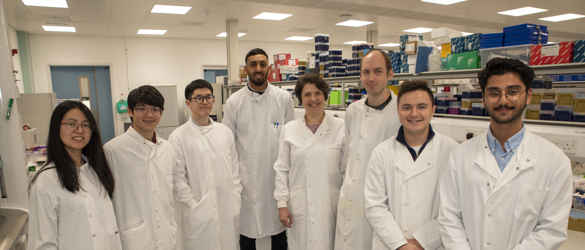A marvellous new approach to tackle retinopathy

Prof Karl Matter, UCL - £489,423 (co-funded with Diabetes UK)
High blood sugar levels can lead to damage to our eyes, known as retinopathy. Professor Karl Matter thinks that a protein called MarvelD3, that helps cells to stick together in blood vessels, might hold some answers. His research could provide valuable new insights to develop innovative approaches to protect blood vessels and prevent sight loss for people with diabetes.
What is the problem?
People with diabetes have a higher risk of damage to the blood vessels in their eyes, called retinopathy. When cells in the eye get damaged, more blood vessels start to grow to try to get a blood supply back. But these new vessels are much weaker, and vulnerable to more damage.
Blood vessels are lined with special cells called endothelial cells. These cells ‘glue’ together, with the help of a sticky substance, to form a barrier between the blood vessel and its surrounding. Professor Karl Matter thinks that a protein found in this sticky substance, called MarvelD3, could be key to keeping the endothelial cells strong and healthy, reinforcing blood vessels and preventing further eye damage.
What are they doing?
Prof Matter and his team want to explore how MarvelD3 supports the development of new blood vessels and if it could be harnessed to treat retinopathy. They’ll grow blood vessel cells in dishes in their lab and look into MarvelD3’s role in protecting the cells when blood sugar levels are high. They’ll investigate which parts of the cells are important by using complex cell biology and DNA analysis techniques. The team will also look at the activity and function of the cells depending on the conditions in their surroundings.
Based on insights from their work in cells, they’ll develop a new treatment that targets MarvelD3 and test it in mice with diabetes. They’ll check the mice’s vision by taking photos of their eyes, like retinal screening in humans, to see how effective their treatment could be.
How can this help?
We currently don’t know enough about how retinopathy develops and progresses, and treatment options are limited and don’t work for everyone. Prof Matter’s research into the biology of cells in our eyes could help scientists develop urgently needed new ways to protect blood vessels, helping people with diabetes to avoid devastating sight problems.
See our other projects
Since 1987 the Macular Society has invested around £10 million in over 100 research projects.
Explore more research
Beating macular disease through funding medical research and improving the lives of those living with macular disease.
Get the latest research news from the Macular Society
To hear about life-changing research and treatments, subscribe to our monthly enewsletter today. Together we can Beat Macular Disease.
Sign up to our free email newsletter



